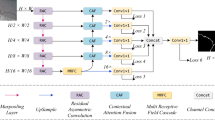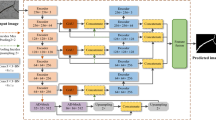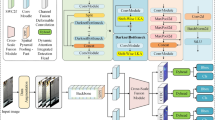Abstract
Roads frequently experience cracks. It adversely impact the safe passage of vehicles and pedestrians, and have the potential to alter the road’s structure. To address this issue, we propose a novel crack detection network. The network constructs multi-channel attention and enhanced information interaction mechanisms to capture more granular semantic information. In our network, each convolutional layer is followed by a convolution combining asymmetric convolutions and criss-cross attention to enhance the feature maps post-convolution. This is followed by spatial and channel reconstruction convolutions and shuffle attention to optimize the generated side-output features. By extensively mining features from the deep network and ingeniously integrating bottom-level and top-level features through a new feature fusion module. The network achieves precise crack prediction results. Extensive experiments on the general-purpose crack image datasets Crack500, CFD and DeepCrack demonstrate the model’s effectiveness. In these three datasets, F1-score values of 0.734, 0.635, and 0.881, MIoU values of 0.773, 0.726 and 0.888.








Similar content being viewed by others
Data availability
Data are available on request to the authors.
References
Krishnamoorthy, S., Zhang, C., Yanxin, Z.: Implementation of image fusion to investigate wall crack. In: International Conference on Emerging Trends in Information Technology and Engineering, pp. 1–3, Vellore, India (February 2020)
Liu, Y., Yao, J., Xiaohu, L., Xie, R., Li, L.: Deepcrack: a deep hierarchical feature learning architecture for crack segmentation. Neurocomputing 338, 139–153 (2019)
Oliveira, H., Correia, P.L.: Automatic road crack detection and characterization. IEEE Trans. Intell. Transp. Syst. 14(1), 155–168 (2012)
He, J., Wang, Y., Wang, Y., Li, R., Zhang, D., Zheng, Z.: A lightweight road crack detection algorithm based on improved yolov7 model. Signal Image Video Process. 18, 1–14 (2024)
Sheng, S., Yin, H., Yang, Y., Chong, A., Huang, H.: DUNet: dense u-blocks network for fine-grained crack detection. SIViP 18(2), 1929–1938 (2024)
Ronneberger, O., Fischer, P., Brox, T.: U-net: Convolutional networks for biomedical image segmentation. In: Medical Image Computing and Computer-Assisted Intervention—MICCAI 2015: 18th International Conference, pp. 234–241 (2015)
Xie, Y., Zhan, N., Zhu, J., Bingli, X., Chen, H., Mao, W., Luo, X., Ya, H.: Landslide extraction from aerial imagery considering context association characteristics. Int. J. Appl. Earth Obs. Geoinf. 131, 103950 (2024)
Zhu, J., Zhang, J., Chen, H., Xie, Y., Hengchao, G., Lian, H.: A cross-view intelligent person search method based on multi-feature constraints. Int. J. Digit. Earth 17(1), 2346259 (2024)
Cao, S., Feng, D., Liu, S., Xu, W., Chen, H., Xie, Y., Zhang, H., Pirasteh, S., Zhu, J.: BEMRF-net: boundary enhancement and multiscale refinement fusion for building extraction from remote sensing imagery. IEEE J. Sel. Top. Appl. Earth Observ. Remote Sens. 1, 1–17 (2024)
Zhang, T., Wang, D., Yang, L.: ECSNET: an accelerated real-time image segmentation CNN architecture for pavement crack detection. IEEE Trans. Intell. Transp. Syst. 24(12), 15105–15112 (2023)
Enhui, G., Xiao, G., Lian, F., Tongyao, M., Hong, J., Liu, J.: Segmentation and evaluation of crack image from aircraft fuel tank via atrous spatial pyramid fusion and hybrid attention network. IEEE Trans. Instrum. Meas. 72, 1–14 (2023)
Zhou, Q., Zhong, Q., Fang-rong, J.: A lightweight network for crack detection with split exchange convolution and multi-scale features fusion. IEEE Trans. Intell. Veh. 8(3), 2296–2306 (2023)
Yang, L., Huang, H., Kong, S., Liu, Y., Hongnian, Yu.: PAF-net: a progressive and adaptive fusion network for pavement crack segmentation. IEEE Trans. Intell. Transp. Syst. 24(11), 12686–12700 (2023)
Sun, X., Xie, Y., Jiang, L., Cao, Yu., Liu, B.: DMA-net: deeplab with multi-scale attention for pavement crack segmentation. IEEE Trans. Intell. Transp. Syst. 23(10), 18392–18403 (2022)
Yao, H., Liu, Y., Li, X., You, Z., Feng, Yu., Weiwei, L.: A detection method for pavement cracks combining object detection and attention mechanism. IEEE Trans. Intell. Transp. Syst. 23(11), 22179–22789 (2022)
Zhang, X., Huang, H.: Lightaunet: a lightweight fusing attention based U-Net for crack detection. In: 2022 7th International Conference on Image, Vision and Computing, pp. 178–182, Xi’an, China (2022)
Zhou, Q., Zhong, Q., Wang, S.-Y., Bao, K.-H.: A method of potentially promising network for crack detection with enhanced convolution and dynamic feature fusion. IEEE Trans. Intell. Transp. Syst. 23(10), 18736–18745 (2022)
Jia, Y., Rong, C., Wu, C., Yang, Y.: Research on the decomposition and fusion method for the infrared and visible images based on the guided image filtering and gaussian filter. In: 2017 3rd IEEE International Conference on Computer and Communications, pp. 1797–1802, Chengdu, China (March 2017)
Huang, Zilong, Wang, Xinggang, Huang, Lichao, Huang, Chang, Wei, Yunchao, Liu, Wenyu: Ccnet: Criss-cross attention for semantic segmentation. In: Proceedings of the IEEE/CVF international conference on computer vision, pages 603–612, Long Beach, CA, USA (February 2019)
Ding, X., Guo, Y., Ding, G., Han, J.: strengthening the kernel skeletons for powerful CNN via asymmetric convolution blocks. In: Proceedings of the IEEE/CVF International Conference on Computer Vision, pp. 1911–1920, Long Beach, CA, USA (February 2019)
Li, J., Wen, Y., He, L.: SCConv: spatial and channel reconstruction convolution for feature redundancy. In: Proceedings of the IEEE/CVF Conference on Computer Vision and Pattern Recognition, pp. 6153–6162, Vancouver, Canada (August 2023)
Zhang, Q.-L. Yang, Y.-B.: SA-Net: shuffle attention for deep convolutional neural networks. In: ICASSP 2021–2021 IEEE International Conference on Acoustics, Speech and Signal Processing, pp. 2235–2239, Toronto, Ontario, Canada (May 2021)
Shi, Y., Cui, L., Qi, Z., Meng, F., Chen, Z.: Automatic road crack detection using random structured forests. IEEE Trans. Intell. Transp. Syst. 17(12), 3434–3445 (2016)
Yang, F., Zhang, L., Sijia, Yu., Prokhorov, D., Mei, X., Ling, H.: Feature pyramid and hierarchical boosting network for pavement crack detection. IEEE Trans. Intell. Transp. Syst. 21(4), 1525–1535 (2020)
Han, C., Tao Ma, J., Huyan, X.H., Zhang, Y.: CrackW-Net: a novel pavement crack image segmentation convolutional neural network. IEEE Trans. Intell. Transp. Syst. 23(11), 22135–22144 (2022)
Ran, R., Xu, X., Qiu, S., Cui, X., Wu, F.: Crack-SegNet: surface crack detection in complex background using encoder–decoder architecture. In: Proceedings of the 2021 4th International Conference on Sensors, Signal and Image Processing, pp. 15–22, New York, USA (October 2021)
Zou, Q., Zhang, Z., Li, Q., Qi, X., Wang, Q., Wang, S.: Deepcrack: learning hierarchical convolutional features for crack detection. IEEE Trans. Image Process. 28(3), 1498–1512 (2019)
Liu, H., Miao, X., Mertz, C., Xu, C., Kong, H.: Crackformer: transformer network for fine-grained crack detection. In: Proceedings of the IEEE/CVF International Conference on Computer Vision, pp. 3763–3772, Montreal, QC, Canada (October 2021)
Xie, S., Tu, Z.: Holistically-nested edge detection. In: Proceedings of the IEEE/CVF International Conference on Computer Vision, pp. 1395–1403, Santiago, Chile (October 2015)
Gao, G., Guoan, X., Yi, Yu., Xie, J., Yang, J., Yue, D.: MSCFNet: a lightweight network with multi-scale context fusion for real-time semantic segmentation. IEEE Trans. Intell. Transp. Syst. 23(12), 25489–25499 (2022)
Fan, Z., Li, C., Chen, Y., Wei, J., Loprencipe, G., Chen, X., Di Mascio, P.: Automatic crack detection on road pavements using encoder–decoder architecture. Materials 13(13), 2960 (2020)
Yang, L., Huang, H., Kong, S., Liu, Y., Hongnian, Yu.: PAF-net: a progressive and adaptive fusion network for pavement crack segmentation. IEEE Trans. Intell. Transp. Syst. 24(11), 12686–18700 (2023)
Qi, Y., He, Y., Qi, X., Zhang, Y., Yang, G.: Dynamic snake convolution based on topological geometric constraints for tubular structure segmentation. In: Proceedings of the IEEE/CVF International Conference on Computer Vision, pp. 6070–6079
Chen, L., Ying, F., Lin, G., Yan, C., Harada, T., Huang, G.: Frequency-aware feature fusion for dense image prediction. IEEE Trans. Pattern Anal. Mach. Intell. 46, 10763–10780 (2024)
Zheng, Wenwen, Jiang, Xiaoyan, Fang, Zhijun, Gao, Yongbin: TV-Net: a structure-level feature fusion network based on tensor voting for road crack segmentation. IEEE Trans. Intell. Transp. Syst. (2024). https://doi.org/10.1109/TITS.2023.3334266
Acknowledgements
This work was supported by the National Natural Science Foundation of China (62176034, 62471076), the Science and Technology Research Program of Chongqing Municipal Education Commission (KJZDM202300604, KJZDM202301902), the Natural Science Foundation of Chongqing (cstc2021jcyjmsxmX0518, 2023NSCQMSX1781).
Author information
Authors and Affiliations
Contributions
Zhong Qu and Lihui Zhou wrote the main manuscript text. Xuehui Yin prepared figures 1-5. Tong Lu prepared figures 6-8. All authors reviewed the manuscript.
Corresponding author
Ethics declarations
Conflict of interest
The authors declare no conflict of interest.
Additional information
Publisher's Note
Springer Nature remains neutral with regard to jurisdictional claims in published maps and institutional affiliations.
Rights and permissions
Springer Nature or its licensor (e.g. a society or other partner) holds exclusive rights to this article under a publishing agreement with the author(s) or other rightsholder(s); author self-archiving of the accepted manuscript version of this article is solely governed by the terms of such publishing agreement and applicable law.
About this article
Cite this article
Qu, Z., Zhou, L., Yin, X. et al. A crack detection network with multi-channel attention and enhanced information interaction. SIViP 19, 37 (2025). https://doi.org/10.1007/s11760-024-03581-8
Received:
Revised:
Accepted:
Published:
DOI: https://doi.org/10.1007/s11760-024-03581-8




